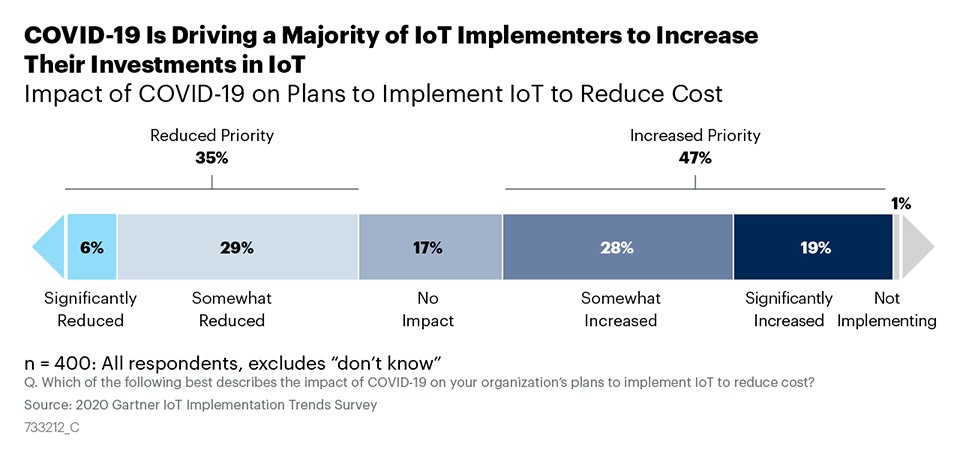Despite the disruptive impacts of the Covid-19 lockdown, with 35% of organisations reducing their investments in the internet of things (IoT), a larger number of are now planning to invest more in IoT implementations to reduce costs among other benefits, according to research from Gartner.
he analyst’s study, Survey analysis: Covid-19 use cases are driving IoT adoption, powered by innovations like AI and digital twins, was conducted online from June through July 2020, with 402 respondents across the US, the UK, Germany, Australia, Singapore and India.
It found that 47% of businesses plan to increase their investments in IoT, with a main reason behind the increase being that while companies have a limited history with IoT, IoT implementers produce a predictable return on investment (ROI) within a specified timeframe.
“They use key performance indicators [KPIs] to track their business outcomes and, for most of them, they also specify a timeframe for financial payback of their IoT investments, which is three years on average,” said Benoit Lheureux, research vice-president at Gartner.
Gartner also noted that as IoT investments are relatively new, most companies have plenty of low-hanging fruit cost-saving opportunities to pursue, such as predictive maintenance on commercial and industrial assets like elevators or turbines, and optimisation of processes such as increasing manufacturing yield.
As a result of Covid-19, 31% of survey respondents said that they use digital twins to improve their employee or customer safety, such as the use of remote asset monitoring to reduce the frequency of in-person monitoring for hospital patients and mining operations, for example.
The survey showed that 27% of companies plan to use digital twins as autonomous equipment, robots or vehicles.
“Digital twins can help companies recognise equipment failures before they stall production, allowing repairs to be made early or at less cost,” added Lheureux. “Or a company can use digital twins to automatically schedule the repair of multiple pieces of equipment in a manner that minimises impact to operations.”
Gartner expects that by 2023, one-third of mid to large-sized companies that applied IoT will have implemented at least one digital twin associated with a Covid-19-motivated use case.

Another consequence, said the report, was that the enforcement of safety measures has also fuelled the adoption of artificial intelligence (AI) in the enterprise. Surveyed organisations said they have applied AI techniques in a pragmatic manner.
A quarter of firms were found to favour automation through remote access and zero-touch management, while 23% are choosing procedure compliance (safe automation measures) to reduce Covid-19 safety concerns.
The analyst pointed out that organisations can monitor work areas using AI-enabled analysis of live video feeds to help enforce safe social distancing compliance in high-traffic areas such as restaurants and manufacturing lines.
Gartner expects that by 2023, a third of companies that have implemented IoT will also have implemented AI in conjunction with at least one IoT project.
Offering comment on the research, Erik Brenneis, IoT director at Vodafone Business, said: “IoT technology has made a huge difference during the Covid-19 crisis, while more broadly businesses are really starting to see its benefits.
“Our recent IoT spotlight report found that 87% of organisations see IoT as vital for future success, and 77% of adopters increased the pace of IoT projects during the pandemic.
“It is no longer just about providing cost savings, it is changing the way that businesses think and operate and providing an opportunity to re-design operations and future-proof business models. It is now an essential technology for businesses of all sizes that want to be resilient, more flexible and quicker to adapt and react to change.”



